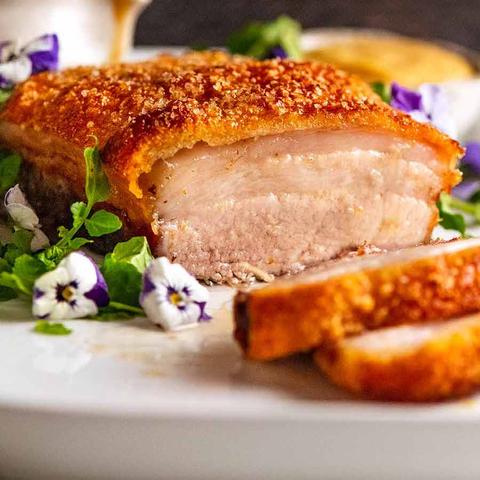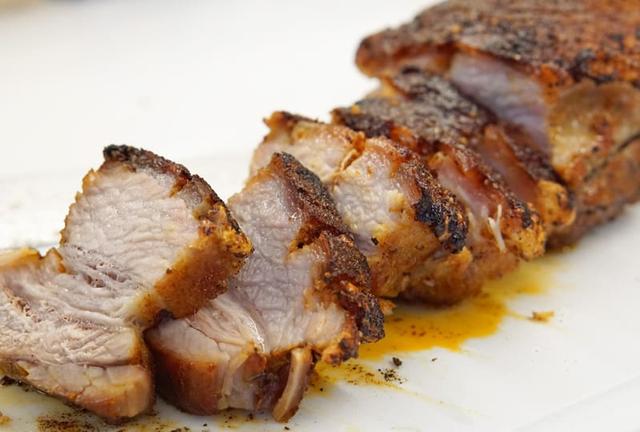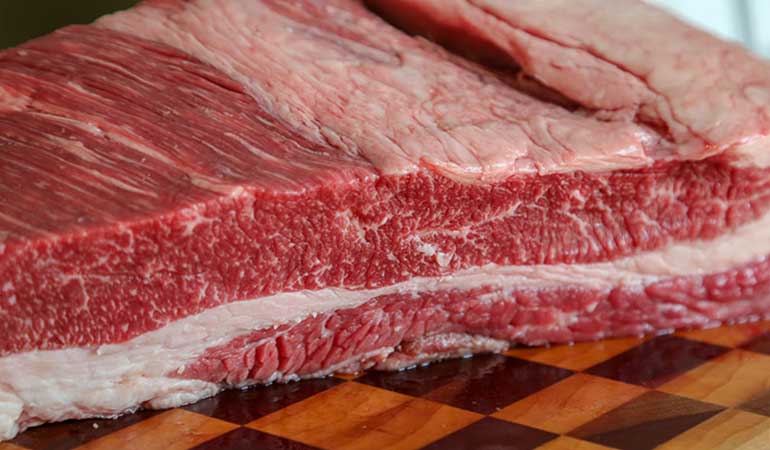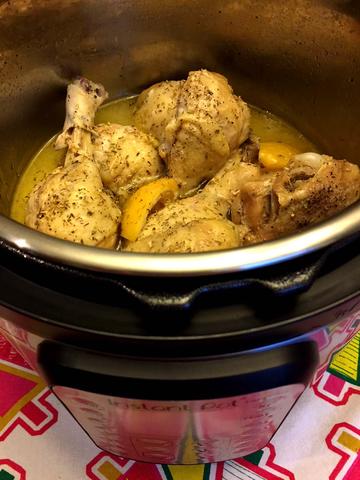
“Indulge in the mouthwatering tenderness of slow cooker pork belly, a delectable dish that combines succulent cuts of pork with rich flavors. Perfectly cooked to perfection, this melt-in-your-mouth delicacy promises an unforgettable culinary experience.”
Pork Belly in the Slow Cooker
Pork belly is a cheaper cut of meat that can be incredibly tender and flavorful when cooked properly. One of the easiest ways to achieve this is by cooking it in a slow cooker. The long cooking time allows the meat to become tender and the fat to properly render, resulting in a moist and fall-apart texture.

While the slow cooker can make the pork belly tender, it cannot crisp up the skin. To achieve that perfect balance of crispy and tender textures, you will need to finish off the pork belly under the broiler for 5-10 minutes. It’s important to keep an eye on it to avoid burning.
The skin of the pork belly is an important consideration. If you don’t wish to keep it on, you can easily remove it with a sharp knife before cooking. However, if you want to keep the skin on and make it crispy, you will need to score it and rub it with a dry rub containing plenty of salt. This helps dry out the skin for optimal crispiness.
The cooking time for pork belly in a slow cooker can vary depending on its thickness. It’s recommended to check the meat after 6 hours with a fork. If it pulls away easily, it’s done. The longer you cook pork belly, up until all the fat has rendered down into nothing, the softer and more tender it becomes. However, overcooking can result in dry and tough meat.
You can add extra flavor to your pork belly by using a dry rub or marinade before cooking. There are various options available or you can create your own using herbs, spices, and salt. If you prefer a simpler flavor, just seasoning with salt is sufficient.
Ingredients You Need
Pork Belly – Try to buy one that is about 2 pounds in size and is uniformly shaped, so that one side isn’t thicker than the other. You will be cooking it with the skin on. But if you don’t want the skin, just remove it and discard.
Chicken or beef stock – You can use a boxed chicken broth, or mix water with a cube of chicken bouillon. Try and stay away from the low sodium stock.
Dry Rub – You can use any type of dry rub that you like, if you don’t want to mix up the seasonings to make the rub we recommend. You can also just use 1/2 tablespoon of salt.
Be sure to check the pork belly after 6 hours to see if it’s done. The meat should easily pull away and the fat layer should be very soft and spongy. If it’s not done, continue cooking for up to an additional hour, checking frequently.
If it not necessary to crisp the skin of the pork, if you don’t mind it not being crisp.
How to Make Pork Belly in the Slow Cooker

How to Make Pork Belly in the Slow Cooker:
1. Prepare the pork belly by scoring the skin and rubbing it with a dry rub that includes plenty of salt. This will help dry out the skin and make it crispy when cooked.
2. In the slow cooker, add 1/2 cup chicken or beef stock, one chopped onion, and two crushed garlic cloves.
3. Place the pork belly on top of the stock mixture in the slow cooker.
4. Close the lid and cook on low for 6-7 hours. Check after 6 hours with a fork to see if it easily pulls away, indicating that it’s done.
5. If desired, finish off the pork belly by placing it under the broiler for 5-10 minutes to crisp up the skin. Be sure to keep an eye on it to avoid burning.
6. Once cooked, slice the pork belly to your desired thickness and serve.
Note: The longer you cook the pork belly in the slow cooker, up to a point where you’ve properly rendered the fat, the softer and more tender it will become. However, be careful not to overcook it as this can result in dry and tough meat.
How To Get Crispy Skin

To get crispy skin on pork belly, there are a few steps you can take. First, if you want to keep the skin on and crisp it up at the end, you will need to score the skin and rub it with a dry rub that has plenty of salt in it. This helps to dry out the skin so it can become crispy.
To score the skin, use a sharp knife to make cross-hatch patterns on the skin, making sure not to cut into the meat. Then, slather the dry rub onto the scored skin, making sure to get it into the slits.
After cooking the pork belly in the slow cooker for 6-7 hours on low with chicken or beef stock, one chopped onion, and crushed garlic cloves, you’ll need to finish off by placing it under the broiler for 5-10 minutes. Be careful not to place it too close to the cooking element as it may burn quickly. Keep an eye on it to avoid burning.
Once you’ve finished crisping up the skin under the broiler, you can slice and serve the pork belly. It’s recommended to turn it upside down before slicing as it makes cutting through the crispy skin easier.
Remember that while cooking pork belly for a long time is necessary for tenderizing and rendering fat, there is a point where overcooking can result in dry and tough meat. The key is finding that sweet spot where the fat has properly rendered but the meat remains moist and fall-apart tender.
Whether you choose to keep or remove the skin, adding flavor with a dry rub or just salt is essential for enhancing taste. You can find a link to a homemade dry rub recipe in the topic information.
Overall, cooking pork belly in a slow cooker is an easy way to achieve tender and flavorful results. Just be mindful of how long you cook it and don’t forget about crisping up that deliciously crispy skin!
Tips & Notes
– Pork belly can become tender and softer the longer it is cooked, as the fat layers break down and render.
– It is important to properly cook pork belly to achieve that perfect balance of crispy and tender textures.
– Cooking pork belly in a slow cooker is a great way to ensure it turns out tender and juicy without overcooking.
– The slow cooker cannot make the skin crispy, so it needs to be finished off in the oven or removed before cooking.
– The skin of pork belly needs to be scored and rubbed with a dry rub containing salt to help dry it out for crisping.
– Cooking times may vary depending on the thickness of the pork belly, but checking with a fork after 6 hours can determine if it is done.
– Crisping up the skin under the broiler for 5-10 minutes is essential for achieving the desired crackling texture.
– Overcooking pork belly will result in dryness and toughness, so it’s important to cook it until the fat has properly rendered but not completely disappeared.
Frequently Asked Questions

Frequently Asked Questions:
Q: Does pork belly get softer the longer you cook it?
A: Yes, pork belly becomes softer the longer you cook it. The slow cooking process allows the meat to become tender and the fat to properly render.
Q: Can I make pork belly in the slow cooker?
A: Yes, cooking pork belly in the slow cooker is a great way to achieve a perfectly tender result. However, the slow cooker cannot crisp up the skin, so you will need to either finish it in the oven or remove the skin before cooking.
Q: How long should I cook pork belly in the slow cooker?
A: The cooking time for pork belly in the slow cooker can vary depending on its thickness. It is recommended to cook a 2-pound pork belly for 6-7 hours on low heat. Thinner pieces may be done after 6 hours, while thicker pieces may require additional time.
Q: How do I make the skin of pork belly crispy?
A: To achieve crispy skin on pork belly, it needs to be finished off under a broiler for 5-10 minutes. Be careful not to place it too close to avoid burning. Alternatively, you can remove the skin before cooking if you prefer.
Q: Can I use a different seasoning instead of the dry rub mentioned in the recipe?
A: Yes, you can use any type of dry rub or seasoning that you prefer. If you don’t want to make or purchase a dry rub, simply adding salt will also enhance the flavor of the pork belly.
Q: Can I adjust the cooking time for thicker cuts of pork belly?
A: Yes, if your pork belly is thicker than average, you may need to increase the cooking time. It’s always recommended to check for doneness by using a fork and ensuring that it easily pulls away from the meat.
Please note that these answers are based on general information and may vary depending on individual preferences and cooking equipment.
Is it possible to overcook pork belly?
Pork belly can be overcooked if it is cooked for too long, resulting in a dry and tough texture. However, it is important to cook pork belly for a sufficient amount of time to properly render the fat and make it tender. The cooking process for pork belly takes a while due to the high fat content, but there is a point where the fat has completely rendered down and the meat becomes dry and tough.
The longer you cook pork belly, the softer and more tender it becomes up to a certain point. It takes time for the fat to break down and render, which contributes to the tenderness of the meat. Thicker cuts of pork belly may require longer cooking times compared to thinner cuts. It is important to check the doneness of the pork by using a fork. If it easily pulls away, then it is done and should be moist and fall apart tender.
Salt plays an important role in cooking pork belly as it helps in drying out the skin so that it can become crispy when finished under the broiler. Additionally, salt adds flavor to both the skin and meat of the pork. If you do not wish to use a dry rub, you can simply add salt to achieve similar results.
If you have a thicker cut of pork belly, you may need to adjust the cooking time accordingly. Thicker cuts will require longer cooking times compared to thinner ones. It is always recommended to check for doneness by using a fork or measuring internal temperature whenever possible.
While the recipe suggests using a homemade dry rub, you can also experiment with different seasonings and flavors. Some options include marinating the pork belly in teriyaki glaze or using a mix of fresh herbs from your garden. Feel free to get creative and try out different combinations that suit your taste preferences.
If you prefer not to have crispy skin on your pork belly, you can remove it before cooking. Simply use a sharp knife to carefully remove the skin while ensuring not to cut into the meat. However, if you want to achieve crispy skin, it is necessary to score the skin and apply a dry rub with salt to help dry it out and make it crispy.
Does pork belly get softer the longer you cook it?
The longer you cook pork belly, the softer it becomes. Pork belly is a fatty cut of meat that requires a long cooking time for the fat to properly render and break down. This slow cooking process allows the meat to become tender and juicy. However, there is a point at which you can overcook pork belly and it becomes dry and tough. This happens when the fat layer has completely rendered down into nothing. So it’s important to cook the pork belly until it is moist, fall-apart tender, but not overcooked. Additionally, if you want crispy skin on your pork belly, you will need to finish it off under the broiler or remove the skin before cooking.
Do I have to use a dry rub?
Pork belly can be cooked in the slow cooker to make it incredibly tender and flavorful. The long cooking time allows the meat to become tender and the fat to properly render. However, the slow cooker cannot make the skin crispy, so it either needs to be finished in the oven or removed before cooking. The skin is an important consideration for pork belly, as it needs to be scored and rubbed with a dry rub that includes salt to help dry it out and become crispy.
To cook the pork belly in the slow cooker, add chicken or beef stock, chopped onion, and crushed garlic cloves. Place the pork on top and cook for 6-7 hours on low. After 6 hours, check with a fork to see if it easily pulls away. If done, remove from the slow cooker.
To achieve crispy skin, place the pork belly under the broiler for 5-10 minutes, making sure not to burn it. Slice and serve.
The cooking process for pork belly takes time because of its high fat content. It becomes softer as it cooks longer until the fat has properly rendered. Overcooking can make it dry and tough.
A dry rub adds flavor to the pork belly along with necessary salt to dry out the skin for crispiness. If you don’t want to use a dry rub, you can simply add salt.
Overall, cooking pork belly in a slow cooker is an easy way to achieve tender and juicy results, although finishing under the broiler is necessary for crispy skin.
In conclusion, slow cooker pork belly offers a convenient and flavorful way to enjoy this delicious cut of meat. The long cooking process allows for tender and juicy results, while the added spices and seasonings enhance its taste. Whether served as a main dish or used in other recipes, slow cooker pork belly is sure to impress with its melt-in-your-mouth texture and rich flavors.
Learn More About Grilling
If you want to learn more about grilling, check out these other helpful resources!










